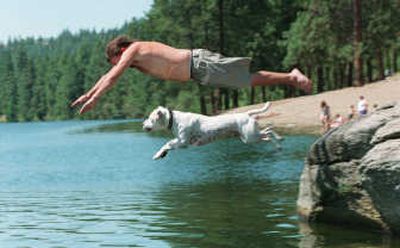Paw’s Corner: Heat, air pollution take toll on pets

Q: I read your column about the person who was concerned about the bird that lived in a home with a smoker. While I don’t smoke, my 11-year-old golden retriever, “Blaze,” has occasional breathing trouble, especially on very hot days when there is a lot of smog.
Her vet prescribed a nebulizer, which helps greatly. Can you let readers know that pets are affected by unhealthy air just as we are, and to make sure they don’t have to struggle to breathe? Thanks. — Jeri G., Atlanta
A: Will do, Jeri! According to Jamie Wolf of HealthyDogsUSA ( www.healthydogsusa.com), when humans feel discomfort from heat and poor air quality outside, dogs are affected 10 times more. So, during the height of summer heat, watch the weather forecasts daily, note the predicted air quality and gauge you and your dog’s activities accordingly.
Take pets for walks earlier in the mornings, when air quality is better and the heat is not so intense. Monitor them closely, particularly senior dogs and small dogs, who are most affected by poor conditions. Make sure pets have plenty of water throughout the day.
Small dogs should not go outside on particularly bad days. You might even consider setting up pee pads or a litter pan during prolonged periods of poor air quality. Set up some indoor exercise for them, such as climbing up and down the stairs or other creative ways to help them work off excess energy.
If a pet is having trouble breathing — excessively panting, drooling, heaving or wheezing — take it to the vet immediately. Sometimes, it is simply a result of poor air quality, but breathing difficulties can also signal more serious conditions.
A vet can recommend supportive treatments for affected dogs, such as a nebulizer treatment after a walk, or homeopathic therapy with herbs like slippery elm (check with the vet or a pet naturopath for safe dosage).